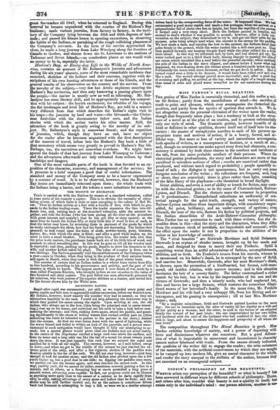MISS PA.RDOE'S RIVAL BEATTIE&
THE genius of Miss Pardoe is essentially rhetorical, and this unfits a wri- ter for fiction ; partly from the onesidedness of mind—the sacrifice of truth to point and phrases, which ever accompanies the rhetorical dis. position, and partly from the species of egotism that attends it. We do not altogether mean the personal obtrusion of the writer upon the reader, though that frequently takes place ; but a tendency to look at the struc- ture of a novel as at the plan of an oration, and to present substantially only one style of mind. The dramatic genius, however humble of its kind or deficient in other qualities, throws itself out of itself into its eha. ranters : the master of metaphysics ascribes to each of his persons ap- propriate traits and motives of action, if in a heavy, forced, and ar- tificial way. But more or less of variety and naturalness accompanies both species of writers, as a consequence of instinct, or a result of art ; and, though no treatment can make a good story from bad elements, a con- sistency is attained by both these classes in the conduct and incidents of the tale, from the more probable conduct of their persons. Where the rhetorical genius predominates, the story and characters are more or less sacrificed to mistaken notions of effect ; results are contrived rather than produced, and without much regard to probability ; people speechify in- stead of talk ; the dialogue is not spontaneous, but to carry out some foregone conclusion of the writer ; the reflections are frequent, and, long or short, they are oratorical; there is glare rather than light, smacking of the false finery of the playhouse—the theatrical in broad daylight. Great abilities, and even a sort of ability or knack for fiction, may coex- ist with the rhetorical genius ; as in the cases of Chateaabriand, Bulwer- Lytton, and Disraeli. But the rhetoric mars the romance in proportion as it predominates Chateaubriand substitutes an uniformity of ora- torical spangle for the quiet truth, strength, and variety of nature; Bulwer-Lytton sacrifices these important things, with consistency super- added, for point, brilliancy, and an under-current of egotism; even Disraeli, the best of the trio, flattens his fiction by political projects, and the fustian absurdities of the Arab-Hebrew-Caucasian philosophy. Miss Pardoe has no pretension to rank with these writers, but she re- sembles them in this—that the story and the characters, when they differ from the common stock of novelists, are improbable anti-unusual; while the effect upon the reader is not in proportion to the abilities of the writer or her knowledge of society.
The " rival beauties " are Gertrude Mortimer and Sybil Delamere. Gertrude is an orphan of slender means, brought up by her uncle and aunt, and designed by them to marry their son Frederic. Sybil is something worse than an artful adventuress of fashion, accomplishments, abilities, and so forth. On Frederic's return from his travels, whence he is summoned on his father's death, he is entrapped by the arts of Sybil, and marries her. Meanwhile, Gertrude, after her aunt Mortimer's death, is thrown upon the protection of a kindhearted, but formal, cold-man- nered, old maiden relation, with narrow income; and in this situation fascinates the heir of a county family. The father contemplated a richer match for his heir, but is won by the importunities of his son and the virtues of Gertrude; and then a miserly uncle, who had neglected her, dies and leaves her a large fortune, which restores the somewhat dilapi- dated means of her betrothed's family. In the mean time, Mr. Frederic Mortimer and his wife lead a very unhappy life, from her flirting and ex- travagance, and his gaming in consequence ; till at last Mrs. Mortimer elopes ; and,
" By a singular coincidence, Sybil and Gertrude quitted London on the same day: the one to immolate upon the altar of vanity all her dignity as a wife and all her purity as a woman; and the other, to seek in the bosom of an attached family the reward of her past trials: the one impoverished by her own follies, and burdened with the ruin of the husband who had confided in her; the other, rich in hope, and about to secure the happiness and prosperity of all whom she best loved.
The composition throughout The Rival Beauties is good. Miss Pardoe exhibits knowledge of society, and a power of depicting with force and distinctness whatever she conceives. But a good delinea- tion of what is improbable in occurrence and inconsistent in character cannot endow falsehood with troth. From the causes already indicated, the qualities of the writer fail to engage the reader ; the trite substance of the materials, with the artificial contrivances by which they are sought to be vamped up into modern life, give an unreal character to the whole, and render the story unequal to the abilities of the author, because they are exercised on an uncongenial subject.


























 Previous page
Previous page